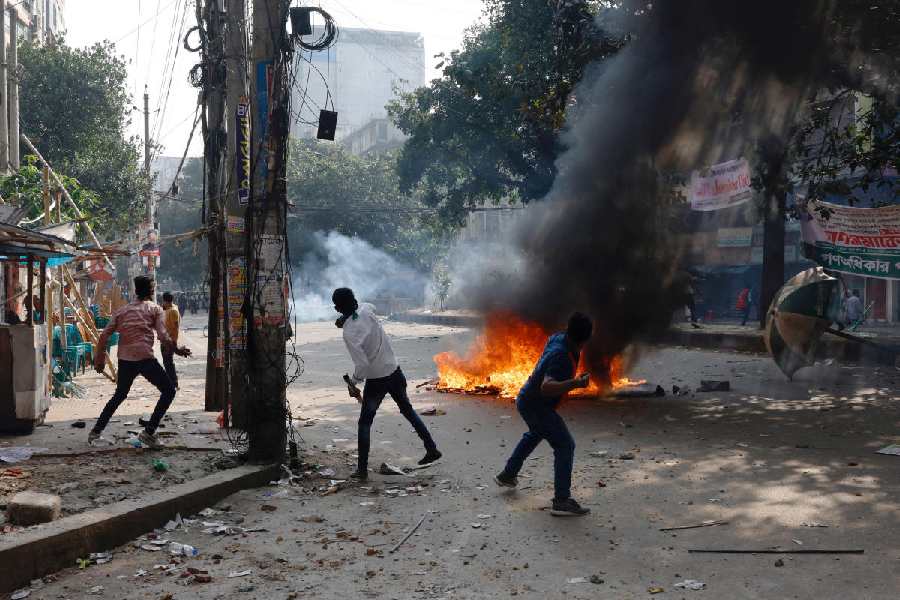The Bangladesh Nationalist Party on Sunday announced nationwide blockades for three days, starting October 31, to press demands such as the immediate resignation of the government, pushing the country into another spell of political uncertainty.
Bangladesh witnessed a total shutdown on Sunday after at least five years, because of a strike call by the BNP whose anti-government rally in Dhaka on Saturday had ended in violence and clashes with police.
Shops, government offices, business establishments and academic institutions remained closed on Sunday.
A cautious Sheikh Hasina administration — shaken by Saturday’s developments in Dhaka such as vandalism of the residence of the country’s chief justice, the daylight killing of an on-duty police constable, and attacks on hospitals, ambulances and journalists — deployed police and paramilitary forces across the country.
Still, reports of arson trickled in from parts of the country, including Dhaka, Sylhet and Chittagong, as BNP supporters went on the rampage after the party’s top leadership, including secretary-general Mirza Fakhrul Islam Alamgir, were arrested over Saturday’s violence in Dhaka.
Sources in Dhaka said that around 400 people, including BNP leaders and cadres, had been arrested across the country and a slew of cases — the offences ranging from murder to conspiracy and destruction of public property — were being slapped on them.
A BNP statement said the nationwide blockade call was to protest these illegal arrests and the general state of lawlessness, corruption, price rise, lack of democracy and harassment of Opposition leaders in the country, among other issues.
BNP senior joint secretary-general Ruhul Kabir Rizvi held a virtual media briefing from an undisclosed location. He blamed the ruling Awami League and the law-enforcing agencies for Saturday’s violence.
He demanded the immediate release of party activists and the resignation of the Hasina government to ensure a free, fair and participatory general election, expected in January 2024.
The Awami League leadership justified the arrests of the BNP leaders claiming they had provoked their party cadres to attack the police instead of holding a peaceful protest.
“The BNP doesn’t want the elections to be held.... They are trying to create an atmosphere of fear and uncertainty in the country,” Biplab Barua, office secretary, Awami League, and special secretary to the Prime Minister, told The Telegraph over the phone.
Barua added: “There is video footage that bears proof that BNP supporters (engaged in) arson during their programme on Saturday.”
Barua said the government would do everything possible to prevent the BNP’s attempts to create anarchy.
He compared Saturday’s arson in Dhaka to the Capitol Hill attack in the US in January 2021 following the defeat of President Donald Trump in the 2020 US presidential election.
Civil society members in Bangladesh expressed concern about the impact of the political uncertainty -- triggered by the BNP’s violent protests -- on the country’s bruised economy.
“The Opposition party has inflicted a spell of uncertainty on the country, especially the economy, by bringing back hartals and shutdowns.... We had almost forgotten such disruptive shutdown calls,” said Barrister Miti Sanjana, a social activist.
She said such disruptive protests were an “irresponsible act” at a time the economic woes of ordinary people had worsened because of a raft of factors such as the Russia-Ukraine war.
Already, the World Bank has slashed the economic growth forecast for Bangladesh -- which faces a severe foreign currency shortage -- by 0.6 percentage points to 6.1 per cent.
The Bangladesh economy, heavily dependent on export earnings and remittances from expatriates, is in stress at a time import costs have zoomed and the inflation rate spiralled out of control.
“We also want a peaceful and a free and fair election, but holding such violent protests and then giving shutdown calls can never be the means to achieving that,” Sanjana said.
“I fear that such acts will add to the misery of the common people and significantly jeopardise the country’s development process.”
The Bangladesh Federal Union of Journalists and the Dhaka Union of Journalists have issued a 72-hour ultimatum to the BNP-Jamaat alliance to apologise to the journalists attacked during Saturday’s rally.
Around 30 journalists were assaulted by alleged BNP supporters on Saturday. Press clubs across Bangladesh organised protest marches on Sunday.











